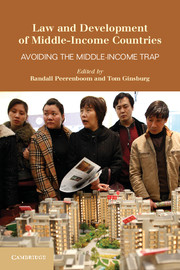Book contents
- Frontmatter
- Contents
- List of Contributors
- Acknowledgments
- 1 Law and Development in Middle-Income Countries
- Part I The Politics of Development in Middle-Income Countries
- 2 The Politics of Law and Development in Middle-Income Countries
- 3 When Does “Politics” Get in the Way of Development?
- Part II Middle-Income Countries in a Globalized Economy
- Part III Good Governance and the Rule of Law in Middle-Income Countries
- Part IV Socioeconomic Challenges in Middle-Income Countries
- Part V International Donor Strategies for Middle-Income Countries
- Appendix Selected Country Data as of 2011
- Index
- References
2 - The Politics of Law and Development in Middle-Income Countries
Published online by Cambridge University Press: 05 June 2014
- Frontmatter
- Contents
- List of Contributors
- Acknowledgments
- 1 Law and Development in Middle-Income Countries
- Part I The Politics of Development in Middle-Income Countries
- 2 The Politics of Law and Development in Middle-Income Countries
- 3 When Does “Politics” Get in the Way of Development?
- Part II Middle-Income Countries in a Globalized Economy
- Part III Good Governance and the Rule of Law in Middle-Income Countries
- Part IV Socioeconomic Challenges in Middle-Income Countries
- Part V International Donor Strategies for Middle-Income Countries
- Appendix Selected Country Data as of 2011
- Index
- References
Summary
INTRODUCTION
Middle-income countries (MICs) are a diverse group of economies. The category includes tiny island states like Kiribati and Tuvalu along with giants such as Russia, Nigeria, and Pakistan. It includes some economies nearly entirely dependent on oil exports (South Sudan), and others reliant on agriculture (Uzbekistan), tourism (Maldives), hydropower (Lao PDR), and a few fully industrialized economies (Latvia). The category also includes countries in every region, with every sort of religious and cultural background.
Politically, as well, the category is a diverse one. It includes established democracies (Jamaica), dictatorships (Turkmenistan), monarchies (Jordan), republics (Fiji), and theocracies (Iran). It includes leftist Bolivarian Regimes (Ecuador and Venezuela), those governed by the political right (Rumania), and those governed by madmen (Qadafi’s Libya). Is it possible to make any generalizations about such a diverse group?
My thesis is that it is possible and that MICs face a particular set of challenges that are, ultimately, political rather than technical or purely economic in nature. The basic problem is one of path dependency. Institutions that are suitable for growth at the early stages of development may not be able to work for later stages. Instead, the regime that gets the country to middle-income status may stick with the strategies and institutions that have worked to date. After all, early-stage economic growth underpins regime legitimacy, and may generate increasing political returns that lock in particular structures.
- Type
- Chapter
- Information
- Law and Development of Middle-Income CountriesAvoiding the Middle-Income Trap, pp. 21 - 35Publisher: Cambridge University PressPrint publication year: 2014
References
- 3
- Cited by



